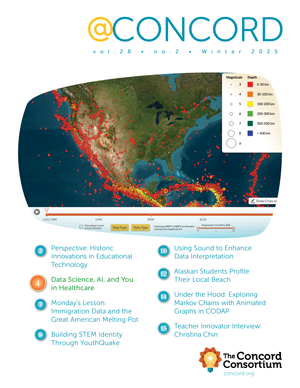News at Concord Consortium
Q. Why is artificial intelligence important to education?
Chao: There are two main categories of work in AI in education. The first is looking at ways to use AI to help students learn and teachers teach. This is the important work Leslie is doing. I’m focused on the second main category, which is helping students learn about AI. The inequalities arising from current AI development are partially rooted in the unequal access to AI educational opportunities. I’d like to see that change.
Bondaryk: The very best teachers watch a student progress over weeks, months, or even years to help them reach the next level in their educational engagement. AI has the potential to support teachers in tracking students’ development and making timely interventions. I’m excited about the work we’re doing on the Mobile Design Studio project to make this happen. (See the “Under the Hood” article for more details.)
Q. Why do you think AI belongs in K-12 education?
Chao: Teaching AI seems like a very narrow topic that belongs in computer science classes, but there’s a wave of technology advancement that is going to affect all of society. Basic AI literacy is going to be a necessity. All students need to learn how AI works and how AI is developed, and then build on that knowledge to become AI developers or professionals able to use AI to solve real-world problems.
Bondaryk: I don’t think there’s a place where AI doesn’t belong. Talking to ChatGPT is like having a good brainstorming partner, not because it’s smart exactly, but because its knowledge of the universe is very broad.AI can help teachers recognize various patterns in student learning, or be a good “partner” for a student who wants to cultivate an idea. It’s time-consuming and in some cases impossible for a human to preconceive every helpful response for a student. An AI system can look at what a student is doing and figure out the appropriate response based on the patterns that it identifies in their work or questions.
Q. What is the future of AI in education?
Chao: It’s really hard to say what the future looks like at this point because there is an established infrastructure of how education is done right now. If we work with what exists, the application of AI to support teaching and learning has to feed into existing practices. If you look into the very far future, rethinking learning from the ground up and looking at how AI can play a role, the potential is enormous. I recommend reading AI 2041: Ten Visions for Our Future by Kai-Fu Lee and Chen Qiufan.
Bondaryk: When people say they want to be cautious about introducing AI into classrooms, I don’t think we need to be worried about creating a replacement for good teachers. We need to be concerned about where the source material came from. Generative AI is only as good as the data that it’s fed, and it’s pretty easy to make it support your own biases. I hope that as a country and society we can agree that we need definitive information and unbiased systems. We know how to make them happen, we just have to take the time and money to create them, and to make them available to everyone.
This material is based upon work supported by the U.S. Department of Education S411C230070 and the National Science Foundation under Grant No. DRL-2201215. Any opinions, findings, and conclusions or recommendations expressed in this material are those of the author(s) and do not necessarily reflect the views of the funders.
